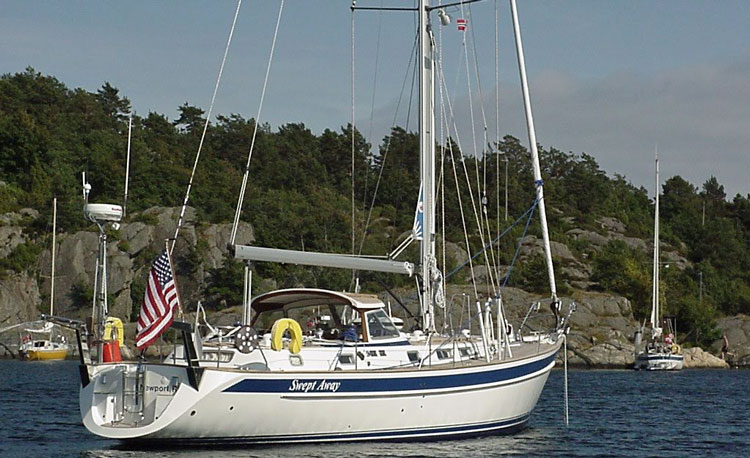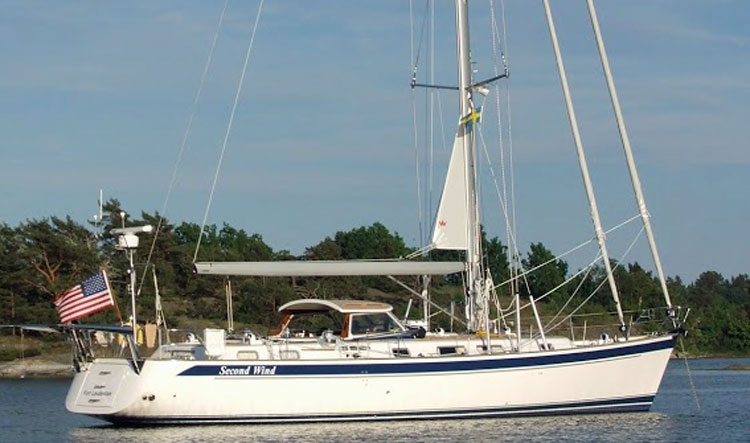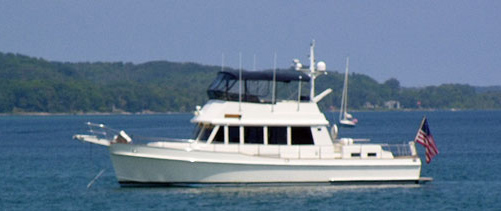 |
 |
 |
Sunday, May 8, 2011, in Lymington, England
Hi everyone and Happy Mother’s Day to all. This is our first week aboard. There will be a lot of sailing miles this season, but we’ll end up in the Mediterranean, where the boat belongs, and in France, where the palate is treated like a king. Hopefully not Louis XVI, though. Here’s what’s happened this week so far.
Our ride from London back to the boat on the south coast of England was decorated with springtime across the landscape. Unlike the splash of reds and oranges that illuminates our hometown horizon in South Florida, this is a Laura Ashley-inspired palette. Flowers in pastel shades shyly emerged from roadside trees and tiny, orderly British gardens. Our drive took us through the New Forest, which is undoubtedly older than anything in America, where we saw horses that looked like characters in fairy tales, and country towns that looked like they were auditioning for Merchant-Ivory placement.
Lymington, the 2010-2011 home base of Second Wind, was wrapping up a record-breaking three weeks of glorious warm weather. Locals were both grateful for April and superstitious about August. We’ve noticed this in Scandinavia, too. Whenever there's a pre-season spell of tolerable weather, people in Northern Europe assume that this forebodes a terrible, cold summer. I don’t want to tell them my theory. The brief good weather doesn’t affect anything later on. A warm spring doesn’t predict a summer that's too chilly. All of the summers are too chilly.
Our first stop was the Berthon boatyard, to drop off our four large checked suitcases and our three smaller carryon ones. This season is the first time we’ve returned to this boat when it hadn’t been prepared, primped and launched before our arrival. It’s also the first time that the boat was stored outdoors for the winter. But the boatyard had removed some of winter’s assault; the bottom was newly painted, and the hull was waxed. The yard was also set to wash the decks for us after the boat was back in the water.
The launch wasn’t scheduled until the next day, and we can’t really live on a boat that isn’t floating. So we’d made a reservation with a small hotel in town for one night. After the overnight flight, we’d get our money’s worth out of the bed.
The boat looked fine, even though most boats don’t look right out of the water. Our keel isn’t strong enough or balanced enough to manage the hull and the rigging. A dozen wooden props that create a makeshift cradle keep the boat upright against the winter winds. It’s probably just following a rule of nature. A sea lion, which maneuvers gracefully under water, doing flips and darting around, looks ungainly and uncomfortable as it makes its way around ashore on its little legs. The boat just looks eager to get back into the sea.
Art climbed the ladder alongside the hull, prepared a pulley and tossed the end to me. I attached our bags, one at a time, and sent them up for him to put them below. I kept back a small bag with our toiletries and a change of clothes for the hotel.
There were a few hours of daylight, so we went below and unpacked our luggage. I was hoping to avoid climbing that boarding ladder, but Art couldn’t wait to start working, as always. In this marina, the ladder certainly meets all the requirements for strength, and must comply with safety; it’s locked on one side with a giant chain lock, and tied on securely on the other. But this was my first time up the hull of this boat, and it’s tall, The eight-foot keel sits on a wooden platform, and the hull is probably another five or six feet high. Because the ladder takes up the whole width of the gate, you have to swing your leg over the lifelines, another couple of feet. I think that the whole process involves climbing vertically about the height of a two-story house. It’s a little creepy.
We finished what we could before it started to get dark, and stopped at a pub for an early dinner on the way to the hotel. Your first meal overseas is a sure bet to be wrong. You’ve been eating every five or six hours since you left for the airport. The meals you eat during travel from the US to Europe only bear a mild resemblance to meals you’d have eaten if you hadn’t left. Dinner aboard the airplane doesn’t normally happen until well after your normal dinner hour, and you’ve probably relented and eaten a bad dinner already in the airport. Still, you can’t pass up the tiny plate, as you’re never sure you’ll eat again.
You have breakfast at midnight or so, on your former clock. Then you get off of the plane and maybe you eat lunch (we didn’t.) If you do stop for lunch, you’re eating lunch at your biological breakfast time. If you don’t, you’re skipping the mid-day meal. In any case, you’ve eaten more meals than you need, and less than you want, and none of the food is remotely tasty. Not that long ago, overseas airlines gave you a printed menu and a complimentary glass of wine with your airborne dinner. Granted, if you consider the charge-per-mile of then versus now, the incremental cost of dinner was in the Michelin star range. But in exchange for the low prices that we appreciate, the meal now doesn’t measure up to the breakfast we’d get on the 45-minute flight from Philadelphia to Pittsburgh only a few decades ago.
On the plus side, the first pub meal upon one’s arrival in the UK is always a delight (much better than the thirtieth, for example.) And that was all the processing my body was then willing to do. By the time we had finished eating, I was holding my eye open with my fingers any time I had to read anything.
In the morning, the boatyard launched us and towed the boat to a berth in the marina. Art filled the water tank and started the systems we need for living aboard: the hot water, the refrigerator, and various sorts of magic that I don’t even know is there. About this time every year is the moment that we both realize we have forgotten how to live on a boat. I can’t remember how many hitches I normally put in a cleated line. Art forgets where he stores his shaving cream. I look at an empty cabinet and can’t remember what I keep in there while we’re living aboard.
All the men sound like Jeremy Clarkson or Ricky Gervais. For some reason, this year, we have become quirky in a British way. Art has to restrain himself from referring to his “shed-yule” when he’s arranging appointments. While I was transporting a large empty cart around a corner, a near-collision with a man with a 2x4 on his shoulder prompted me to think “well, we certainly have the makings of a Benny Hill moment here.” Trust me; I don’t normally give Benny Hill a thought.
Then there are also the systems that fail just when we arrive, instead of failing for us in the fall when we have all winter to fix them. The engine starter was temperamental, as was the spark to light the burners on the stove. The hot water heater kept shorting and blowing the breaker. The air conditioner, which admittedly won’t be needed for some time, failed. We had about a week to sort all of those dodgy bits out (see, I’m doing it again.)
And now a check on the weather. The days have been sunny and lovely. Nighttime alternates between cool and marginally cold. Art loves this weather for working outdoors, and I have to admit that cooking in a tiny galley is much less burdensome if I’m not nearly passing out every so often.
Our goal was to be ready for a Monday (one week) departure. We met our obligation, but the weather failed on its part. The job now is simply to wait for a forecast that we can match with a course.
And so it begins again. Have a wonderful Mother’s Day and don’t forget to write. We might be far, but we’re always connected.
Love, Karen (and Art)